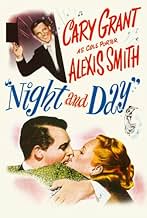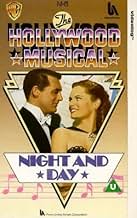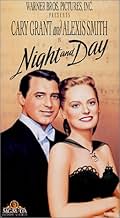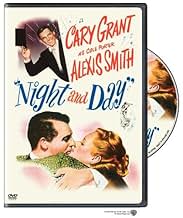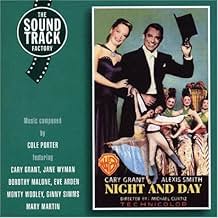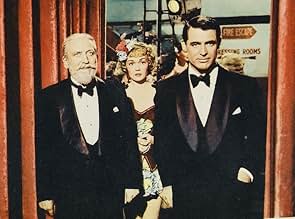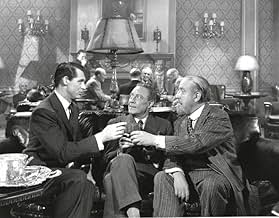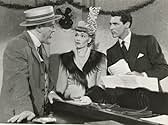ÉVALUATION IMDb
6,1/10
3,4 k
MA NOTE
Ajouter une intrigue dans votre langueA fictionalized biopic of composer Cole Porter from his days at Yale in the 1910s through the height of his success to the 1940s.A fictionalized biopic of composer Cole Porter from his days at Yale in the 1910s through the height of his success to the 1940s.A fictionalized biopic of composer Cole Porter from his days at Yale in the 1910s through the height of his success to the 1940s.
- Nommé pour 1 oscar
- 2 nominations au total
Avis en vedette
I enjoyed seeing Cary Grant in a movie that I had not seen this movie before. I noticed a lot of good actors as well. I understand Cole Porter wished Cary Grant to be cast to play the famous composer. It's impossible to anticipate if you will like this movie, those who wish to be more critical always find fault in every movie, but fans of Cary Grant, Cole Porter, and the many other fine actors found in this movie may be quite happy watching it. I recommend watching it to judge for yourself. You will find Monty Woolley, whose fine personality is not in enough films. Always beautiful Alexis Smith is never more beautiful. Jane Wyman plays a substantial role worth viewing. Keep an open mind and enjoy the movie!
If you want a biography of Cole Porter you better go to the library, you won't find it here. This is a highly entertaining but strictly fictional version of his life--played by no less than Cary Grant, in his usual debonair style, perhaps just a shade understated so as to appear more like Porter. Whatever, he's still Cary Grant (playing himself in a minor key) and since the music is what makes this film tick, you'll forgive whatever liberties the scriptwriters have taken. It all looks wonderful in glowing technicolor.
Alexis Smith never was able to make a warm presence on the screen despite her talent and striking good looks. She seems even more remote here as the woman Porter woos and marries. Monty Woolley has a fine time playing himself. The musical moments are handled nicely by some talented people: Ginny Simms, Eve Arden, Jane Wyman and Mary Martin doing her "My Heart Belongs to Daddy" routine. All of the Porter standards are nicely done.
Interesting tidbit: Was Oscar nominated for "Best Scoring of a Musical" but lost to "The Jolson Story".
Relaxing entertainment. Just don't expect a truthful bio.
Alexis Smith never was able to make a warm presence on the screen despite her talent and striking good looks. She seems even more remote here as the woman Porter woos and marries. Monty Woolley has a fine time playing himself. The musical moments are handled nicely by some talented people: Ginny Simms, Eve Arden, Jane Wyman and Mary Martin doing her "My Heart Belongs to Daddy" routine. All of the Porter standards are nicely done.
Interesting tidbit: Was Oscar nominated for "Best Scoring of a Musical" but lost to "The Jolson Story".
Relaxing entertainment. Just don't expect a truthful bio.
After suffering through "Delovely", I had to feel good again about Cole Porter's music. Where Delovely focuses on Porters Homosexuality, a subject that Night and day ignores, Night and day performs his music in brilliant fashion. Forget the corny fictionalized screenplay and just sit back and enjoy:
Mary Martins version of My Heart Belongs to Daddy.
Cary Grant singing "Your The Tops".
Cole Porter's stirring "Night and Day", "Begin the Beguine". A song that Delovely totally butchers.
"It was Just One of Those Things" The Haunting "In the Still of the Night"
And so many more.
This is strictly for Cole Porter's music. If your interested in how he enjoyed his spare time, Delovey is for you. For me, I just enjoy his music.
Mary Martins version of My Heart Belongs to Daddy.
Cary Grant singing "Your The Tops".
Cole Porter's stirring "Night and Day", "Begin the Beguine". A song that Delovely totally butchers.
"It was Just One of Those Things" The Haunting "In the Still of the Night"
And so many more.
This is strictly for Cole Porter's music. If your interested in how he enjoyed his spare time, Delovey is for you. For me, I just enjoy his music.
Good musical that could have been even better if it had better editing.Starts slow and then builds momentum.The directing style was inconsistent where in there are scenes that are top quality and then there are scenes that are just done in a rushed and sloppy way which is weird because those bungled scenes are those that are easily done.Despite these faults,the MUSIC here to any big music fan will certainly encourage you to forgive and enjoy.Grant is very stiff here but this is due to his capturing Porter's mannerisms.The biography is toned down/adjusted to Porter's version for the mainstream audience,so if one really wishes to dig into his real life which is very x-rated stuff,read his bio books instead.The production of this film coupled with it's great music will be great for one who wants uncontroversial musical entertertainment.I love the 1940's color technique here too.Only for early 2oth century POP music fans and big fans of the lead actors......
Unlike film biographies of George Gershwin, Jerome Kern, and Sigmund Romberg or for that matter Rodgers&Hart, those artists were gone by the time the silver screen told their stories. But Cole Porter was very much still with us when Night and Day was released in 1946 and some of his best work was yet to come.
If Cole Porter had his druthers Cary Grant would never have played the part of himself. Porter fancied himself as more the Fred Astaire type. But given the nature of what happened to Porter in his life, a dancing Cole Porter was out of the question.
There's not too much that's accurate in this film. Cole Porter was born and raised in Indiana in affluent surroundings. Yes he went to Yale and his best and lifelong friend that he acquired from Yale was Monty Woolley. Yes he did marry the older and glamorous Linda Lee Thomas. And yes he composed some of the most beautiful and sophisticated songs ever done.
Of course his marriage to Linda Lee was a sham. In the vernacular of the time Linda served as his beard, his cover as it were because Cole Porter was gay. As was his lifelong friend Monty Woolley.
Were they ever involved with each other. Maybe as youths, but from what I've heard their tastes were different. Porter liked his male partners as sophisticated as he was and as beautiful as his songs were. Monty on the other hand was known for picking up street kids from Maine to California until he died.
One thing that was true although glamorized for the film, Porter did serve in the French army during World War I. No wounds however, no hearing of African rhythms from Senegalese troops were he got the idea for Night and Day.
Night and Day sure jumbles up even the order of his shows. Porter was writing songs from before Yale, but he did not score a commercial musical comedy hit until the show Paris in 1928 where the song Let's Do It was featured. I sure didn't know that In the Still of the Night was originally done as a Christmas Carol way back in his youth for instance.
In fact Where the Still of the Night, along with I've Got You Under My Skin, Rosalie, and Easy to Love were all written for MGM musicals. You can take it to the bank that Louis B. Mayer soaked Jack Warner for plenty to get those songs heard in a Warner Brothers film. Similarly the title song Night and Day, heard in The Gay Divorce on Broadway first, made its screen debut in RKO's The Gay Divorcée. Jack Warner must have paid RKO plenty for that one also.
The other true thing is the fall from a horse that Porter suffered in the late thirties, the constant pain he was in all of his life. It took 28 operations to save his legs back in the thirties. In 1958 long after the story in the film ended, Porter did eventually lose a leg and from then on lived as a recluse in his suite at the Waldorf Towers. Linda Lee Thomas Porter had passed away about a decade before.
Alexis Smith plays Linda Lee here and the cast of Night and Day also includes Jane Wyman, Dorothy Malone, Selena Royle, Tom D'Andrea, Henry Stephenson, Donald Woods. Playing themselves are Mary Martin and Monty Woolley. Singer Ginny Simms of the Kay Kyser band sang many of the Porter tunes for the film.
Night and Day certainly captures Porter's sophistication. Of course the gay lifestyle and a pretty hedonistic one at that which Porter led would not be shown at all back in the days of the Code. Some might complain about that pleasure driven pursuit that Porter had his whole life. If he sought beauty and pleasure in the world, Cole Porter certainly gave enough of it back to the world to justify it.
After Night and Day, Cole Porter had still yet to write such film scores as The Pirate, High Society, and Les Girls and such Broadway shows as Kiss Me Kate, Out of this Wolrd, Can-Can, and Silk Stockings. You could score a film with just the material he had yet to write.
It's not a great biographical film, but Night and Day provides as good an excuse as any to listen and appreciate the art that was Cole Porter.
If Cole Porter had his druthers Cary Grant would never have played the part of himself. Porter fancied himself as more the Fred Astaire type. But given the nature of what happened to Porter in his life, a dancing Cole Porter was out of the question.
There's not too much that's accurate in this film. Cole Porter was born and raised in Indiana in affluent surroundings. Yes he went to Yale and his best and lifelong friend that he acquired from Yale was Monty Woolley. Yes he did marry the older and glamorous Linda Lee Thomas. And yes he composed some of the most beautiful and sophisticated songs ever done.
Of course his marriage to Linda Lee was a sham. In the vernacular of the time Linda served as his beard, his cover as it were because Cole Porter was gay. As was his lifelong friend Monty Woolley.
Were they ever involved with each other. Maybe as youths, but from what I've heard their tastes were different. Porter liked his male partners as sophisticated as he was and as beautiful as his songs were. Monty on the other hand was known for picking up street kids from Maine to California until he died.
One thing that was true although glamorized for the film, Porter did serve in the French army during World War I. No wounds however, no hearing of African rhythms from Senegalese troops were he got the idea for Night and Day.
Night and Day sure jumbles up even the order of his shows. Porter was writing songs from before Yale, but he did not score a commercial musical comedy hit until the show Paris in 1928 where the song Let's Do It was featured. I sure didn't know that In the Still of the Night was originally done as a Christmas Carol way back in his youth for instance.
In fact Where the Still of the Night, along with I've Got You Under My Skin, Rosalie, and Easy to Love were all written for MGM musicals. You can take it to the bank that Louis B. Mayer soaked Jack Warner for plenty to get those songs heard in a Warner Brothers film. Similarly the title song Night and Day, heard in The Gay Divorce on Broadway first, made its screen debut in RKO's The Gay Divorcée. Jack Warner must have paid RKO plenty for that one also.
The other true thing is the fall from a horse that Porter suffered in the late thirties, the constant pain he was in all of his life. It took 28 operations to save his legs back in the thirties. In 1958 long after the story in the film ended, Porter did eventually lose a leg and from then on lived as a recluse in his suite at the Waldorf Towers. Linda Lee Thomas Porter had passed away about a decade before.
Alexis Smith plays Linda Lee here and the cast of Night and Day also includes Jane Wyman, Dorothy Malone, Selena Royle, Tom D'Andrea, Henry Stephenson, Donald Woods. Playing themselves are Mary Martin and Monty Woolley. Singer Ginny Simms of the Kay Kyser band sang many of the Porter tunes for the film.
Night and Day certainly captures Porter's sophistication. Of course the gay lifestyle and a pretty hedonistic one at that which Porter led would not be shown at all back in the days of the Code. Some might complain about that pleasure driven pursuit that Porter had his whole life. If he sought beauty and pleasure in the world, Cole Porter certainly gave enough of it back to the world to justify it.
After Night and Day, Cole Porter had still yet to write such film scores as The Pirate, High Society, and Les Girls and such Broadway shows as Kiss Me Kate, Out of this Wolrd, Can-Can, and Silk Stockings. You could score a film with just the material he had yet to write.
It's not a great biographical film, but Night and Day provides as good an excuse as any to listen and appreciate the art that was Cole Porter.
Le saviez-vous
- AnecdotesAfter attending the premiere of the film, Cole Porter supposedly remarked to his wife, Linda, "if I could survive that, I can survive anything."
- GaffesWhen in England, there are street performers singing "Rosalie". The accordion player's hands never press the keys; in fact, his right hand is static throughout the whole scene.
- Citations
Monty Woolley: Haven't you ever wanted to be alone?
Gracie Harris: Yes, but with somebody.
- ConnexionsEdited from Don't Fence Me In (1945)
- Bandes originalesNight and Day
(1932) (uncredited)
Written by Cole Porter
Played during the opening credits and often in the score
Sung by Bill Days
Reprised by passengers on a train
Meilleurs choix
Connectez-vous pour évaluer et surveiller les recommandations personnalisées
- How long is Night and Day?Propulsé par Alexa
Détails
- Date de sortie
- Pays d’origine
- Langue
- Aussi connu sous le nom de
- Tag und Nacht denk' ich an dich
- Lieux de tournage
- société de production
- Consultez plus de crédits d'entreprise sur IMDbPro
Box-office
- Budget
- 4 445 000 $ US (estimation)
- Durée2 heures 8 minutes
- Rapport de forme
- 1.37 : 1
Contribuer à cette page
Suggérer une modification ou ajouter du contenu manquant

Lacune principale
By what name was Night and Day (1946) officially released in India in English?
Répondre

